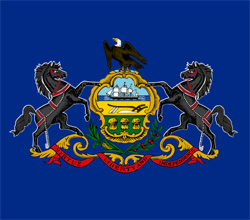An ongoing theme in this space, and indeed in the gambling industry as a whole, has been the rather quick unveiling of plans, some extremely nascent, for states to regulate intrastate online poker. Now Pennsylvania can be added to the ever-increasing list of states taking a serious look at allowing residents to play poker via the Internet.
The Keystone State, which already permits a state lottery and has several land-based casinos, is in the process of expanding casino gambling. A new resort casino property is in the works for metropolitan Philadelphia, a city that has overtaken Atlantic City as a premiere east coast gambling destination. Other Pennsylvania casinos are also planned.
We brought you the story that Pennsylvania as a whole has eclipsed its somewhat downtrodden neighbor, Atlantic City, to become the second-largest gambling market in the United States. Atlantic City, which has faced declining revenues in recent years and was ravaged by Superstorm Sandy last year, is certainly feeling the sting of lost patrons from Pennsylvania who can now visit local casinos and save themselves a drive.
The New Jersey casino industry could stand to benefit once federal dollars in the form of Sandy aid begin to arrive in the region, and would likely also reap the rewards of Internet gambling regulation in that state. Despite signing a law that will permit mobile betting at racetracks earlier this week, New Jersey Governor Chris Christie has not acted on an online gambling bill that would require the servers for such sites to be housed within Atlantic City limits.
In Pennsylvania, State Representative Tina Davis has put forward a bill that would permit Pennsylvanians to play online poker on sites that would be overseen by the current Pennsylvania gaming board. The hefty licensing price – $16.7 million – would likely ensure that established casino brands would be first in line to gain licenses, much like we’ve seen as the licensing process unfolds in Nevada, where a law to legalize online poker was passed last year.
“Considering the nationwide efforts to legalize Internet gaming, it is imperative that we maintain the integrity of our gaming industry amid inevitable federal preemption and competing states, as well as possible expansion of Internet games through the privatization of our own State Lottery.” Davis said in a statement.
She went on to add, “A responsible Internet gaming system must be created in order to protect Pennsylvanians and the success of the established gaming industry in the Commonwealth, which has generated more than $7 billion in state tax revenue, and created more than 16,000 jobs statewide.”
The language used by Davis is similar to the reasoning other states are giving for considering allowing for online poker. Simply put, to an ever-greater extent, states are being forced to compete with one another for gambling revenue. As many state budgets remain deeply diminished by the struggling economy, states from the east coast to the west are participating in a race to expand gambling in many forms.
In addition to Nevada, Delaware has passed an Internet poker bill. Games in both states are expected to begin going live later on this year.

